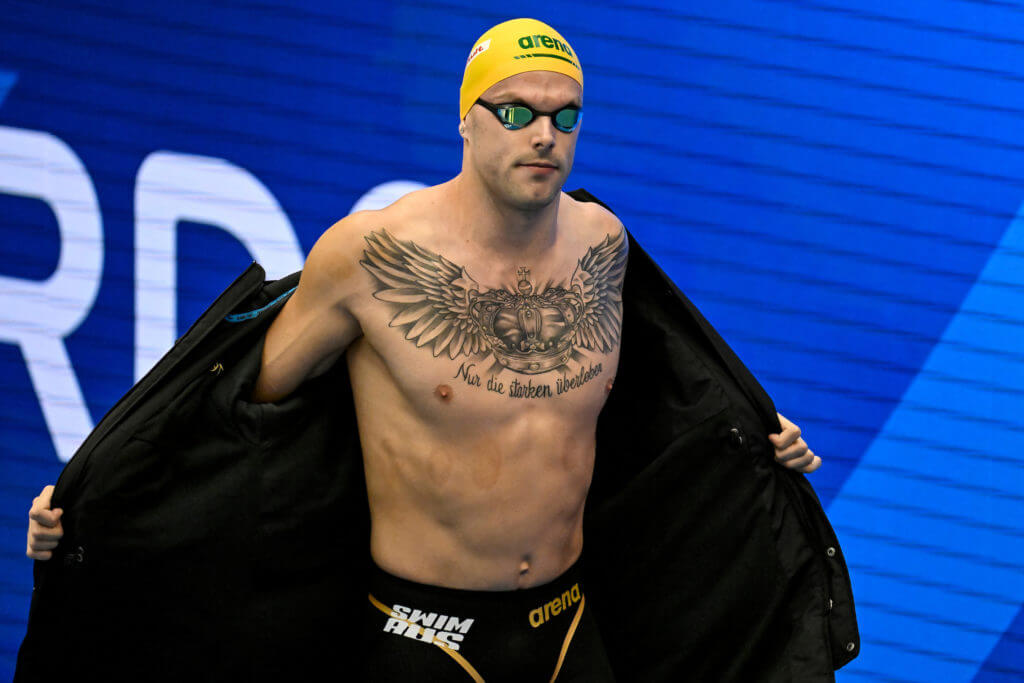Slow Pool at Paris Olympics? ‘Times Are Not All That (Are) Remembered’

Slow Pool at Paris Olympics? ‘Times Are Not All That (Are) Remembered’
The concerns about the status of the competition pool inside La Défense Arena have gotten louder each day of the Olympic swimming competition. While there have been five Olympic records, no world records have fallen thus far in Paris. The winning times in nine out of 12 finals have been slower than the marks recorded at last year’s World Championships in Fukuoka, and the times required to advance to semifinals and finals has been largely slower.
The prevailing theory thus far surrounding the slowdown has been the depth of the competition pool, 2.15 meters (equivalent to a tick over seven feet). Observers have questioned whether the relatively shallow depth is causing swimmers’ waves to bounce quickly back up and slow competitors.
Seven of the eight swimmers who qualified for the men’s 100 breaststroke final entered with seed times under 59 seconds. The only three men to ever break 58, Adam Peaty, Qin Haiyang and Arno Kamminga, were all in the field. But no one swam under 59 in any of the three rounds, with Italy’s Nicolo Martinenghi winning gold in 59.03. For some comparison, seven men broke 59 in the Tokyo Olympic final.
Athletes, at least in public, have largely deflected reporters’ questions about whether the pool is slow, noting they had not noticed anything unusual. They have proclaimed their focus on keeping a meet like the Olympics as normal as possible.
American Jack Alexy followed that line of thinking after qualifying first in the men’s 100 freestyle prelims: “I’m just focused on myself, my process,” he said. “It’s all about racing right now. Times are what the times are going to be. It’s all about executing the race.”
Moments after Alexy spoke, one of his primary rivals in the blue-ribband event became one of the first competitors to publicly subscribe to the concept of a slow pool, although Kyle Chalmers first pointed out several outside factors which could be affecting athlete performance this week aside from pool depth.
“I think there’s a lot of pressure that people put on themselves. It’s the Olympic Games. A lot of people haven’t swum in an Olympics before,” Chalmers said. “I personally love it, but people do definitely crack under that pressure.”
Beyond that, most who do have Olympic experience previously swam in Tokyo, where fans were banned from attending because of the COVID-19 pandemic, a far different scenario than the raucous French crowd frequenting the proceedings this week. Chalmers is one of few leading swimmers who swam in the last normal Olympics, eight years ago in Rio de Janeiro.
But if the pool is not designed to maximize performance, Chalmers does not care. Swimmers are hard-wired to judge their performances based on time, to look for small details upon which they can improve, but at the Olympics, no higher level of racing exists. The results at swimming’s greatest showcase are final, with athletes who falter in Paris having no choice but to wait for Los Angeles. They can hit their best times whenever.
Eight swimmers qualify for the final and get a chance to seek a medal, nothing mattering for the outcome aside from their performance in that very finite window.
“It’s proven the last few nights; it’s about getting your hand on the wall first and winning the race. Times are not all that remembered. It’s whoever wins,” Chalmers said.
“It doesn’t matter whether I’m racing here in Paris or a local pool in (rural) South Australia. It’s all about winning the race in the pool. Everybody has the same opportunity. Everyone has a lane. We’re all swimming in the same pool. It’s not like some people are sending their times in from Trials or anything like that.”

- EVENT PAGE
- SCHEDULE
- VENUE
- STREAMING INFO
- DAY 1 PRELIMS RESULTS
- DAY 1 FINALS RESULTS
- DAY 2 PRELIMS RESULTS
- DAY 2 FINALS RESULTS
- DAY 3 PRELIMS RESULTS
- DAY 3 FINALS RESULTS
- DAY 4 PRELIMS RESULTS
- DAY 4 FINALS RESULTS
- DAY 5 PRELIMS RESULTS
- DAY 5 FINALS RESULTS
- DAY 6 PRELIMS RESULTS
- DAY 6 FINALS RESULTS
- DAY 7 PRELIMS RESULTS
- DAY 7 FINALS RESULTS
- DAY 8 PRELIMS RESULTS
- DAY 8 FINALS RESULTS
- DAY 9 FINALS RESULTS




It’s definitely a slow pool. I don’t know why the pool was designed to be this shallow. Seems like poor planning. I think the athletes are focused on just swimming and don’t want to create drama or insult the host country or the powers that be. ( and let’s face it, those powers have let down the swimmers before. ). While it is basically true that all the swimmers are swimming in the same water and nobody really has an advantage, it is unfortunate that in this spotlight for swimming excellence that only happens once every four years the audience can’t be blown away by world records being set and unimagined barriers being broken. It’s not a given that these athletes who are winning gold can just break that world record next year. The slow pool has not diminished the competition but maybe one could say some of the magic is missing.
Are the dorms and vegan diets having an effect on overall performance.